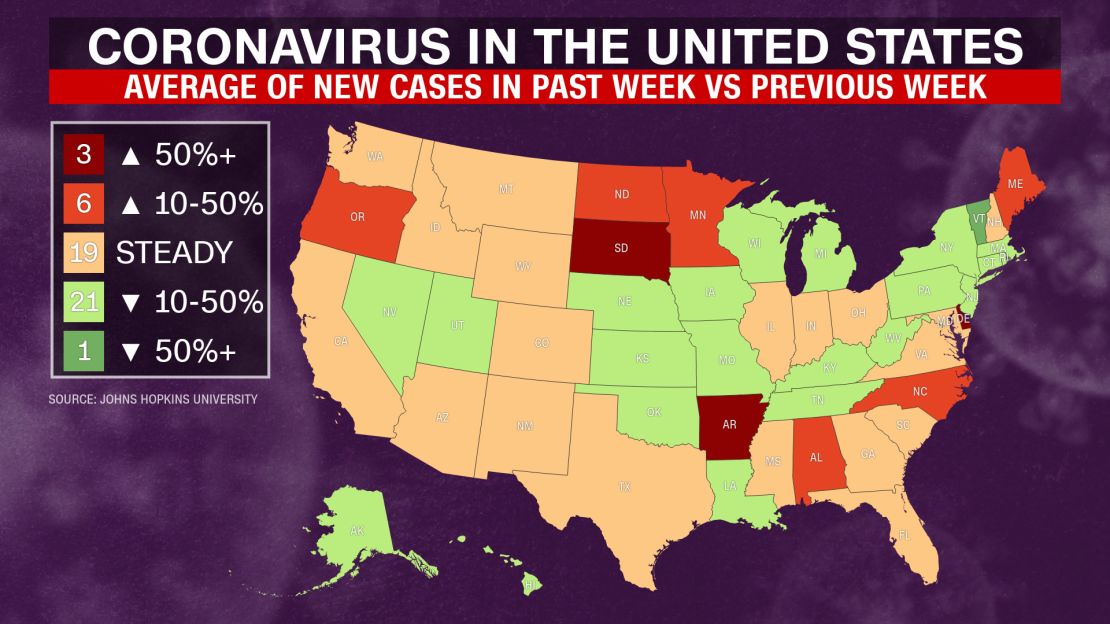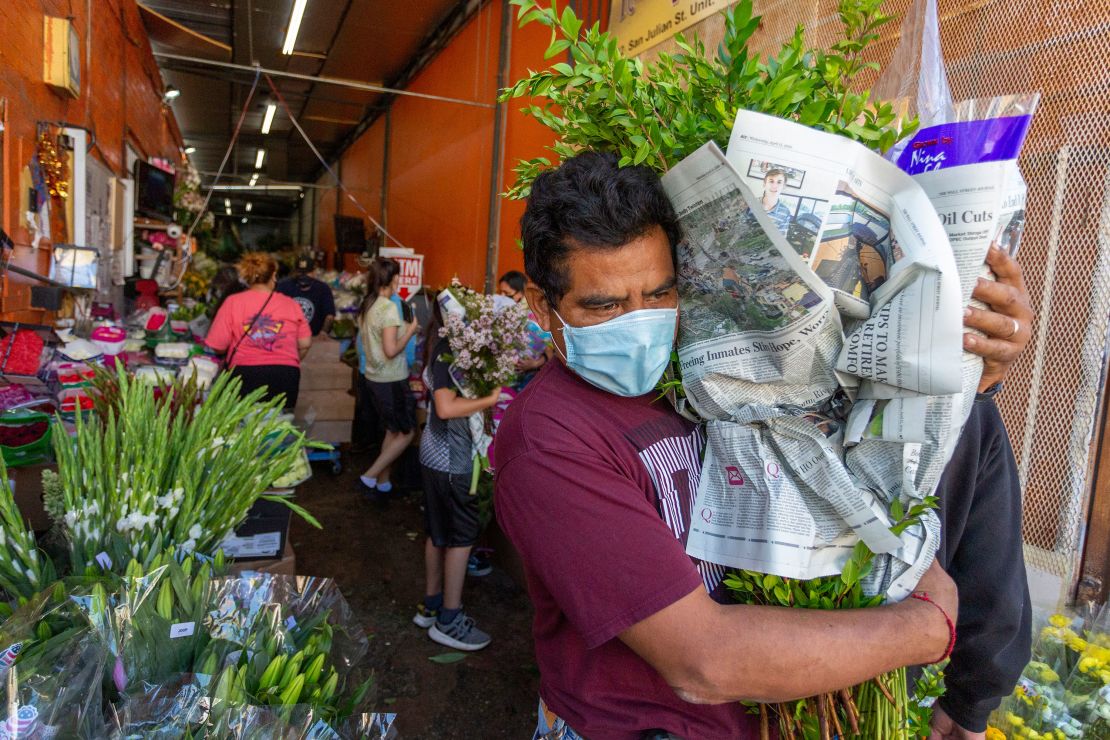Nearly every state in the US is moving toward reopening from pandemic closures, but a leading researcher warns that doing so puts the country on an “unfortunate trajectory” to more coronavirus deaths.
An influential model cited often by the White House now predicts that 147,000 people in the nation will die from the virus by August, the researcher behind the model, Dr. Chris Murray, told CNN’s Don Lemon on Tuesday. It’s an increase of 10,000 deaths from two days earlier and double what was projected two weeks ago.
“We originally had thought that people would go the distance, keep social distance in place right until the end of May,” Murray said. “But what’s happened is states have relaxed early.”
Dr. Ashish Jha, the director of the Harvard Global Health Institute, said states can begin to reopen safely if they meet guidelines on declining cases and have a strong testing and contact tracing infrastructure in place.
“Most states don’t meet that. A few do. They can probably open up safely. But most states don’t. Until we have those in place, we should not be opening up unless we’re willing to take a risk of having large outbreaks,” he said.
“Opening up prematurely just sets us up for big outbreaks, which will force us to shut down again.”
At least 48 states will be partially reopened by Sunday in the midst of a pandemic that has infected more than 1.3 million people and killed over 84,000, according to data from Johns Hopkins University.
Nationally, cases and deaths have been slowly trending downward over the past few weeks. Information from Johns Hopkins comparing the average new cases in the past week to the previous week shows that nine states have seen increases, 22 have seen decreases and 19 have remained about steady.

Droplets with virus can stay in air for eight minutes
When people infected with coronavirus talk, droplets from their mouths can linger in the air and could potentially trigger new infections.
An estimate by researchers at the National Institutes of Health and the University of Pennsylvania finds that talking loudly for one minute in a confined space could generate at least 1,000 speech droplets containing Covid-19 particles.
Those droplets could remain in the air for more than eight minutes, according to the study published Tuesday in the open-access journal PNAS.
That could be enough to generate an infection if someone inhaled them, according to other research.
To conduct the experiment, the researchers had a person repeat the phrase “stay healthy” into a port connected to an enclosure, simulating a stagnant air environment.
The phrase was chosen, the researchers said, because the “th” in the word “healthy” efficiently generates speech droplets.
The researchers used a laser to watch what happened to the droplets that left the person’s mouth.
Large droplets shrunk as they partially evaporated and hung in the air.
The researchers concluded that in real situations, such particles could be inhaled by others and cause new coronavirus infections.
States turn to contact tracing
First it was ventilators, and then testing. Now, states are turning their focus toward contact tracing as weapons in the battle against coronavirus.
New Orleans is taking the unusual step of requiring restaurants with open dining rooms to take reservations with a name and a phone number and keep them for at least 21 days so they can track down people if a case arises.
“Contract tracing comes with the responsibility of all of us,” Mayor LaToya Cantrell said at a news conference. “General public, know where you’re going, take … notes (to) remind yourself of where you’ve been,” she said.
She said she doesn’t know how many will be in Orleans Parish yet, but the state is hiring contact tracers – which several governors said Tuesday they are doing as well.
New Jersey is planning to develop a community contact tracing core that could employ 1,000 to 5,000 people, state Health Commissioner Judy Persichilli said in a news conference. The job could pay up to $25 dollars an hour, Gov. Phil Murphy said.
Georgia Gov. Brian Kemp announced an online tool for contact tracing officials are calling the “Healthy Georgia Collaborative.” The tool will help in allowing “Georgians to identify contacts and monitor symptoms.”
Kemp said there are “nearly 250 staff in the field today,” and that the Department of Public Health “plans to have 1,000 staff deployed in the weeks ahead.”
In Washington state, hundreds of members of the National Guard will be used as part of an interim contact tracing group until more workers and volunteers are trained. They will not have law enforcement power but “simply will be talking to people and helping prevent others from getting sick,” Gov. Jay Inslee said.

Italy sees large increase in children with inflammatory conditions
The coronavirus pandemic has been tied to an increased incidence of an inflammatory syndrome among children in Italy, according to a new study.
The study, published in the medical journal The Lancet, found cases of the rare but serious syndrome appeared to increase 30-fold in the Bergamo province shortly after the coronavirus pandemic spread to the region.
The syndrome, often referred to as Multisystem Inflammatory Syndrome in Children, resembles another childhood condition known as Kawasaki disease. Dr. Lucio Verdoni of the Hospital Papa Giovanni XXIII in Bergamo and colleagues studied the cases of children diagnosed with Kawasaki disease at the hospital between January 1, 2015, and April 20.
The data showed the incidence rate of Kawasaki disease diagnoses was about 0.3 per month before the coronavirus pandemic, and then 10 per month between March and April this year.
“This condition might be serious and requires prompt and more aggressive management,” they added. “Future research on the cause of Kawasaki disease and similar syndromes should focus on immune responses to viral triggers.”
The syndrome involves inflammation, but infectious disease experts say it is different from Kawasaki disease. Symptoms include persistent fever, inflammation and poor function in one or more organs.
Florida welcomes sports’ return
Florida says it is getting ready to play ball.
“What I would tell commissioners of leagues is if you have a team in an area where they just won’t let them operate, we’ll find a place for you here in the state of Florida, because we think it’s important and we know that it can be done safely,” Gov. Ron DeSantis said at a news conference Wednesday.
Major League Soccer has proposed a tournament in Orlando involving its 26 teams, starting in June, according to reports in The Washington Post, The Athletic and ESPN.
When CNN asked about the reports, an MLS spokesperson said, “Our goal remains to play as many games as possible, and we are exploring a wide variety of scenarios and formats for a return to match play. Some of those scenarios include playing matches at one or more neutral sites.”
Major League Baseball is talking about finishing spring training in June and starting a shortened regular season in July, according to ESPN and The New York Times.
Teams would host games at their home stadiums as long as state legislation and health officials allow, the reports said.
The New York Times cited unnamed baseball officials while ESPN cited sources familiar with the situation. CNN has reached out to MLB multiple times without a reply.
Fifteen MLB teams have spring training homes in Florida. Two have regular season homes.
DeSantis said he will announce plans for sports “probably this week.”
CNN’s Jacqueline Howard, Jacob Lev, Kevin Dotson, Melissa Alonso, Arman Azad, John Bonifield, Jason Hanna, Eric Levenson, Cheri Mossburg, Jamie Gumbrecht, Sarah Moon, Jen Christensen, Maggie Fox and Jon Passantino contributed to this report.










